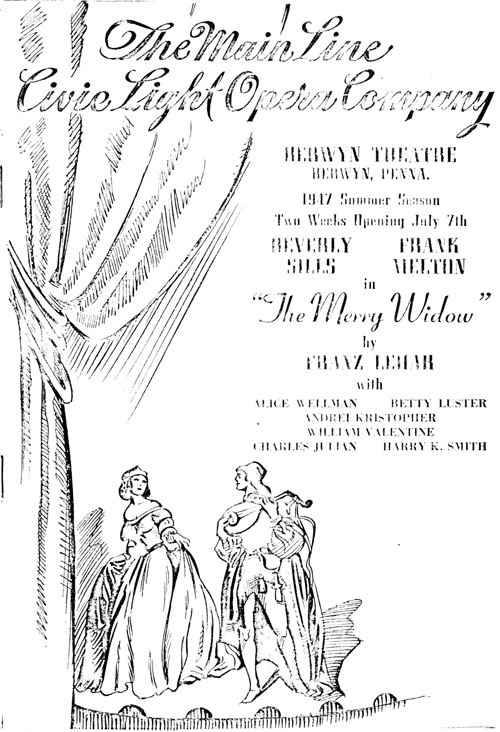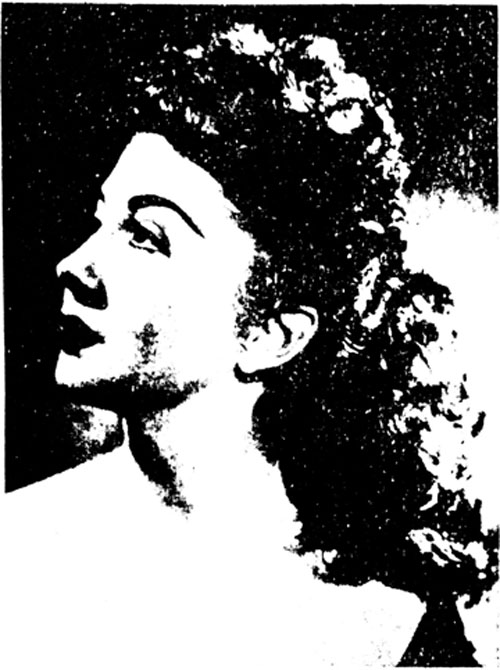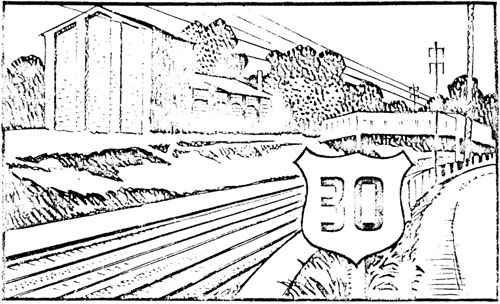|
Home : Quarterly Archives : Volume 19 |
Tredyffrin Easttown Historical Society |
|
Source: July 1981 Volume 19 Number 3, Pages 85–90 When Beverly Sills Sang in Berwyn On July 7, 1947 an eighteen year old Beverly Sills, just beginning her illustrious career, appeared on the stage of the old Berwyn Theater as "The Merry Widow". Early that summer the Main Line Civic Opera Company was formed to give stage performances of operettas and musical comedies in the Berwyn Theater. The owners of the company were Albert F. Bryan, the manager of the theater, Alice Wellman and Harry Harris, of Philadelphia, and Nat Burns, who was also director of productions for the company. (Burns, a nephew of the famous Nat Goodwin, was himself a veteran trooper who had made his stage debut at the age of four. A versatile character and comedy actor, he had played with virtually every well-known star of the theater in his more than fifty years of connection with the stage and movies. One release described him as "one of the best-loved figures of the American stage" who had "been known to direct a play, act the most difficult comedy role in the play, teach a young electrician to light a stage for the first time, assist a willing but inexperienced stage designer in the fundamentals of his trade, change a wistful debutante into a polished performer — and in his odd moments type the business letters by the hunt and peck system".) The company's first production, directed by Miss Wellman, was Rudolph Friml's "The Firefly". Opening on June 24, it ran for two weeks, and received only lukewarm reviews.
Cover of the program
Cast of "The Merry Widow"
Beverly Sills at the time of her appearance in the Berwyn Theater With the second production, however, critical acclaim began. It was "The Merry Widow", by Franz Lehar. Directed by Nat Burns, it featured Beverly Sills as the widow and Frank Melton as Danilo. "The performance," the Upper Main Line News reported, "left little to be desired. If fault must be found, it is with the failure of the cast to respond as fully as they might have done to calls for encore. ... The whole performance is so swell it left a feeling of sincere regret when the final curtain rang down." Concerning the two principal stars, the paper observed, "Beverly Sills was utterly devastating as the widow. Red-haired Beverly met every situation with consummate skill and her rendition of 'Villa' had the audience on the ropes. Melton's whimsical grin and lighthearted debauchery were completely charming and his dancing and singing were superb. It is easy to understand why these two young people are so highly regarded in the theatrical world." The Review in The Suburban and Wayne Times was equally complimentary, "Miss Sills, as the Merry Widow," it was observed, "has a voice of superb quality and would win the hearts of anyone even if she didn't have a sou. The younger generation were carried away by her charm, grace and beauty. ... She is bound to score as one of America's leading prima donnas in the near future." At the time of this production, Beverly Sills had just turned 18 and was at the start of her career. At the end of that summer, she resumed her study of opera, and by the next year had a repertoire of sixty or seventy operas. Her operatic career began in 1951 as a member of Charles Wagner's touring opera company, In 1953 ahe sang with the San Francisco Opera, after which she sang with the New York City Opera, LaScala in Milan, the Berlin Opera, and the Royal Opera in Covent Garden in London. In 1975 ahe joined the Metropolitan Opera Company in New York, and she has also given concerts in many of the leading concert halls throughout the world. Miss Sills was not the only performer of star magnitude to appear in Berwyn during that summer season, however. In late August, the Company changed its name to Main Line Productions, and the following month it "inaugurated a policy of big-name casts". For its first production under this new policy, it brought in Leatrice Joy, a former star of silent movie days, "who had retired at the height of her popularity to be a real mother to her daughter, Leatrice Joy Gilbert, child of the late screen idol, John Gilbert", and who was making a return to the footlights. The next production featured Fritzi Scheff, the former Metropolitan Opera prima donna who had given up grand opera for a career in light opera, and for whom Victor Herbert had composed three operettas, as the lead in "Ladies in Retirement". She, in turn, was followed by Clare Booth Luce, who appeared in a version of "Camille" which she herself had translated, and whose performance was given a "spontaneous tribute" that is "seldom accorded" an actress. Altogether, eleven shows were produced during the summer season. The first three were light operas — Friml's "The Firefly"; Lehar!s "The Merry Widow"; and the comic opera "The Chimes of Normandy" by Robert Planquette — after which the company switched from the more elaborate and costly musicals to dramatic offerings, lowering the prices for seats at the same time, (Tickets for "The Merry Widow" with Beverly Sills and Frank Melton had been priced at $1.00 to $3.00 for the performances on Mondays through Fridays, with reserved seats at $1.20 to $3.60 on Friday and Saturday evenings, tax included.) Among the other plays presented were the comedies "Angels Don!t Marry" and "Dear Ruth"; "Rain" (with Ella Playwin imported from Broadway to play the role of Sadie Thompson, and Nat Burns portraying Joe Horn); Agatha Christie's "Love from a Stranger"; and "Peg O' My Heart" (featuring another Broadway actress, Louise Snyder, as Peg), in addition to "Yes, My Darling Daughter" with Miss Joy; "Ladies in Retirement"; and "Camille". The members of the regular company, in addition to Alice Wellman and Nat Burns, included Howard K. Smith, Betty Luster, Charles Julian, Charles Gray, Claire Louise Evans, William Valentine, and Ruth Carroll, with David Titlow, Virginia Brown, and Paul French also joining the group in the latter part of the season. While the productions, beginning with "The Merry Widow", all received most enthusiastic reviews and drew audiences to Berwyn from a wide area, the season was far from financially satisfying to the company's owners. Two additional plays, "The Little Foxes" with Ruth Chatterton, and "Dream Girl" with Jean Parker, had been planned. But instead, the season was suddenly closed with the last performance of "Camille" on September 21st. In announcing the closing, on the day before the last day of the play's run, Miss Wellman said that after further renovation of the theater a new season would begin on November 1st. Denying rumors that the company would be dissolved, she added that the project would be "refurnished, refinanced; and restaffed", and that with the help of a newly-formed volunteer group, the "Friends of the Theater", operations would be resumed following the "temporary shutdown". But it was not to be. By late fall, the director, Nat Burns, was in Hollywood, working in motion pictures again, and Main Line Productions, together with its predecessor, the Main Line Civic Light Opera Company, was already a part of local theatrical history. But because of it, Beverly Gills once sang in Berwyn, from the stage of the old Berwyn Theater!
The Berwyn Theater (from the program) |



